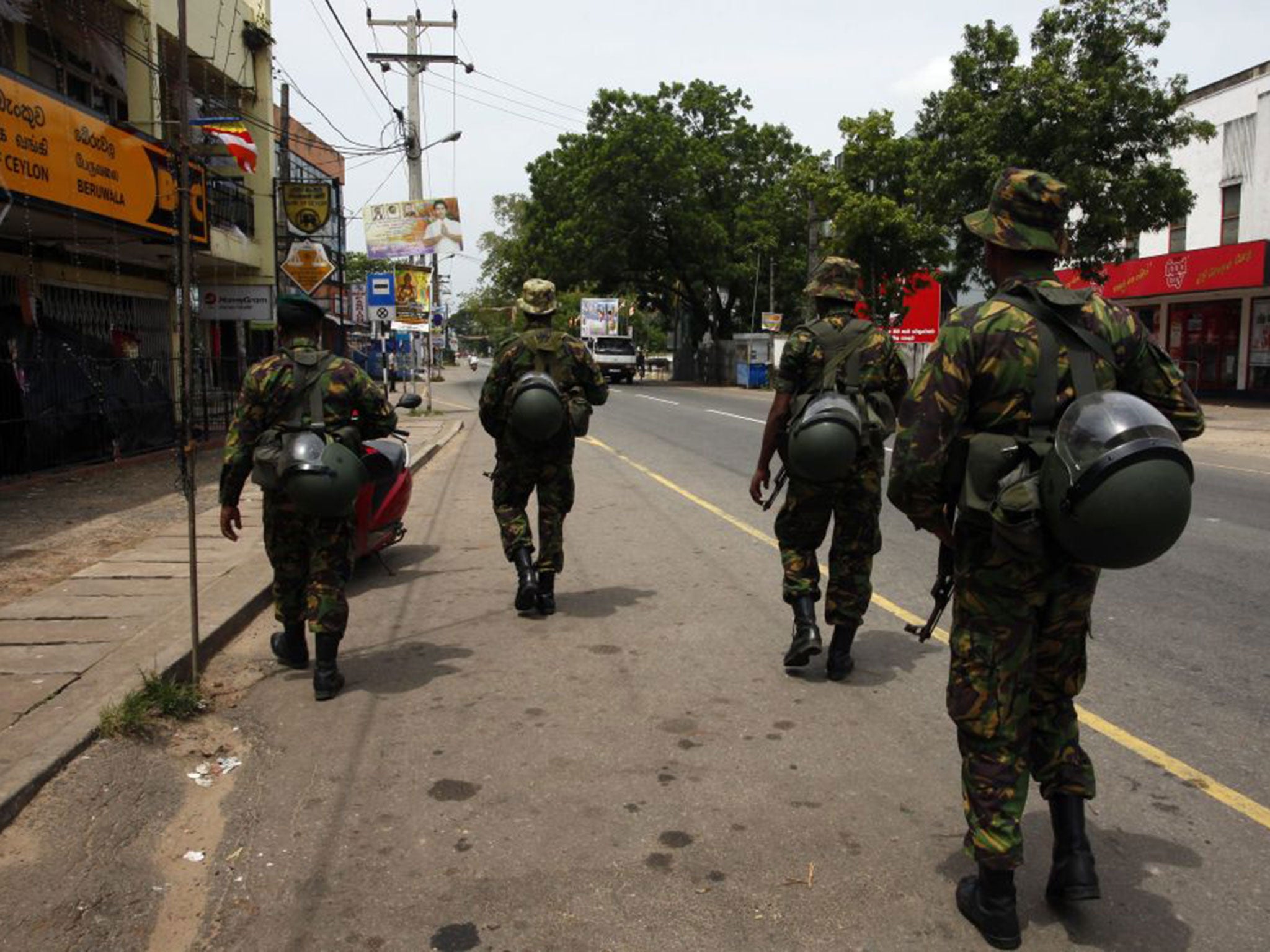Three killed in communal violence in southern Sri Lanka
The number of attacks on Muslims has increased in recent years, some of them by hardline Buddhists

Sri Lanka is tense and anxious after at least three Muslims were killed and 75 people injured in the south of the island in some of the worst communal violence in many years. Muslim homes were reportedly set ablaze and residents forced to flee.
In the latest of an escalating number of attacks on Muslims by hardline Buddhists, violence broke out in several towns on the southern coast better known as tourist destinations. Police urged people to stay in their homes while the government warned journalists not to report anything that could inflame the situation, a declaration that led to something of a news black-out.
“They are crying on the phone, they are asking for help, they are screaming,” Hejaaz Hizbullah, a Muslim lawyer who has been collating witness accounts, told The Independent. “Now the fear has spread to other areas.”
The violence in parts of Aluthgama and Beruwela, Muslim pockets in an area that is mainly Sinhala Buddhist, followed a rally by the hardline Buddhist organisation, the Bodu Bala Sena (BBS), or Buddhist power force. The leadership of the group is made up of monks.
The rally on Sunday by the BBS, which is considered close to President Mahinda Rajapaksa and his brother Gotabhaya, who heads the ministry of defence, was called following an incident involving a Muslim youth and a Buddhist monk. The details of what happened in the incident last Thursday are disputed.
The BBS, which said the monk was attacked, claimed their members were assaulted while holding a peaceful rally on Sunday. Yet residents of the towns told reporters their homes were ransacked and set alight. Three Muslims were apparently shot dead after trying to protect a mosque at Welipitiya.
Muslims make up around ten per cent of the population of Sri Lanka. Over the years they have occasionally suffered both at the hands of the Sinhala Buddhist majority and the Tamil minority, which for years sought an independent homeland. In 1990, thousands of Muslims were forced from their homes in the north of Sri Lanka by the Liberation Tigers of Tamil Eeelam (LTTE) militants.
In recent years, the number of attacks on Muslims has increased, as has the incidence of anti-Muslims speeches, many of which have been made by members of the BBS. The Reuters news agency reported that before the violence at the weekend, the general secretary of the BBS, Galagoda Aththe Gnanasaara, had warned Muslims against attacking Buddhists.
“We still have Sinhala police in this country, still we have a Sinhala military. From today, if any Muslim... mishandles any Sinhalese, that will be the end of them,” he said at a public rally.
Some analysts believe the government is seeking to benefit from such incidents by cementing its Buddhist Sinhala supporters ahead of elections that are not scheduled until 2016 but which could be called early. The government has denied this.
“The government is behind this. The government is very close to the BBS,” said Paikiasothy Saravanamuttu of the Centre for Policy Alternatives, an NGO. “They are trying to push stories about Muslims.”
A number of observers have likened the moves by some Buddhist clergy in Sri Lanka against the Muslim minority to the increasingly hardline position adopted by large parts of the Theravāda Buddhist community in Burma. In Burma, some monks have led a public campaign against Muslims, in particular against the Rohingya minority.
The violence has sparked outcry among many in Sri Lanka, including Rauf Hakeem, a minister in Mr Rajapaksa’s ruling coalition and who heads the country’s largest Muslim party, the Sri Lanka Muslim Congress. He told reporters he could not understand why the BBS had been given permission to hold a rally given that the situation was already very tense.
In the aftermath of the attacks, President Rajapaksa, who is currently in South America, issued a statement on social media urging calm. “The government will not allow anyone to take the law into their own hands. I urge all parties concerned to act in restraint,” he said.
Mr Rajapaksa’s government also issued a warning to the media, insisting that it should not report anything “that could harm religious co-existence in the country”. Several analysts said the effect of this had been that much of the mainstream Sri Lanka media devoted little coverage to the violence.
“Sri Lanka has suffered through many cycles of ethnic violence. From this we should learn two things. One is that unless order is immediately restored and the government’s allies reined in, then the number of dead will rapidly accelerate,” said Fred Carver of the Sri Lanka Campaign for Peace and Justice. “The other is that there is something deeply wrong with the way the government is running the country.”
Subscribe to Independent Premium to bookmark this article
Want to bookmark your favourite articles and stories to read or reference later? Start your Independent Premium subscription today.

Join our commenting forum
Join thought-provoking conversations, follow other Independent readers and see their replies